At the end of January, Kazakhstan’s President Nursultan Nazarbayev called the whole government a group of “cowards” and, for the first time, suggested that the ministers resign. The president singled out the poor economic performance and the dreadful health of the banks in the country. Just weeks later, Nazarbayev suggested again, this time in a more formal setting, that the cabinet quit. Immediately after the presidential request, the whole government presented its resignation and Nazarbayev appointed Vice Prime Minister Askar Mamin as interim prime minister on February 22. Bakhytzhan Sagintayev, the outgoing prime minister, went on the record praising Nazarbayev’s vision for Kazakhstan and effectively accepting the political scolding.
The weekend of speculation on who was going to be the next prime minister, why the president cleared out the cabinet, and whether it was a move related to power transition, ended with very few surprises on February 25, when the parliament – a rubber-stamp institution occupied almost entirely by members of the president’s party – approved the new government with Mamin at its head. Crucially, the reshuffle also included a change at the head of the Central Bank. Outgoing governor Daniyar Akishev had been under fire for months regarding his somewhat maverick policies that did not align with the government’s.
Mamin, a one-time mayor of Astana and a long-serving head of the national railway company Kazakhstan Temir Zholy, had served as vice-prime minister for a little over two years, but is considered a loyal member of the elite close to the president. Curiously, he reportedly shared the same classroom with Karim Massimov, former prime minister and current head of the security service, in elementary school. According to a WikiLeaks cable, they were seen dancing together in a nightclub in 2008.
Significant cabinet changes included the Ministries of National Economy, Labor, Education, and Infrastructure. Other ministers, notably Energy Minister Kanat Bozumbayev, who was severely criticized for a fuel shortage in 2017, and Justice Minister Marat Beketayev, who faced public humiliation when 40 percent of the assets held in the National Fund were temporarily frozen last year, surprisingly saved face and position.
For National Economy, new minister Ruslan Dalenov substituted outgoing Timur Suleimenov, a figure who came under rampant fire after a few years of sluggish growth. Dalenov has served in cabinet positions, especially in the finance ministry, for two decades.
The Ministry of Labor and Social Protection saw the surprising return of Berdybek Saparbayev, who served in this position between 2007 and 2009 under Massimov’s government. Saparbayev, 66 and thus past pension age, was head of a handful of regions in his long career in government and was recently praised by the president for his work as governor of the Aktobe region. Importantly, Saparbayev substituted Madina Abylkasymova, who infamously argued against giving a subsidy to larger families. A few days later, a home burned down, killing the five daughters of two parents who had to work night shifts in order to sustain the family.
Kulyash Shamshidinova, 61, became the minister of education and science, substituting Yerlan Sagadiyev. Shamshidinova served twice as vice minister of education in the past and most recently headed the Nazarbayev Intellectual School system, which prepares pupils to enroll in high-tiered universities.
Roman Sklyar, 47, was promoted to minister of infrastructure and industrial development, substituting Zhenis Kassymbek, who retained his position as vice prime minister. Sklyar was close to Mamin at Kazakhstan Temir Zholy and has served in various ministries.
Another surprise came from the agriculture ministry, which will no longer be occupied by the powerful figure of Umirzak Shukeyev, formerly also head of the state holding Samruk-Kazyna. Saparkhan Omarov, 49 and a former vice minister to Shukeyev, was promoted to head the ministry. The following day, Shukeyev was named governor of the newly formed Turkestan region.
Change was awaited and everyone in Kazakhstan thought that Sagintayev’s days as prime minister were numbered since early 2018. But the expiration date never seemed to arrive.
While some analysts have pointed the finger to the allegedly increasing social unrest in the country, the weak economic situation and the need to refresh the roster seemed to be the causes of the reshuffle. While it is true that rallies for the improvement of the welfare for large families in Astana and protests of jobless youth in the Mangistau region have alerted the leadership, these processes are not usually triggers of government changes.
Commentaries on social media linked Nazarbayev’s odd questioning of the Constitutional Court with regards to an early termination of the president’s position to the reshuffle, arguing that this could be the interim government that transits Kazakhstan into the post-Nazarbayev era. So far, however, this line of reasoning seems to be worth as much as all other attempts to predict Nazarbayev’s exit in the past. More clouds of doubt should be dissipated at the upcoming assembly of the Nur Otan party, where Nazarbayev is expected to give a speech.
Perhaps the most significant change in the government is the appointment of Yerbolat Dossayev, 48, a former businessman, to the post of Central Bank chief. Dossayev, who received a severe scolding three years ago before being sacked as economy minister, will take Akishev’s uncomfortable chair. Nazarbayev has stated clearly that he wants the Central Bank to work closely with the government in order to solve the economic and financial situation in the country, where banks need continuous bailouts and the people have scant means of subsistence compared to the country’s oil wealth.

































